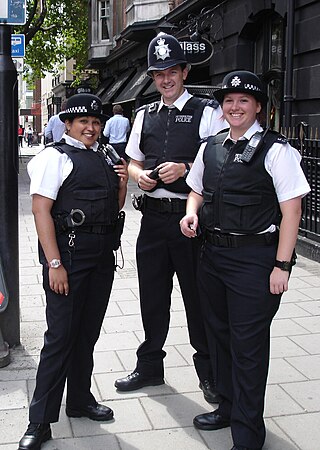Related Research Articles
The United Kingdom has three distinct legal systems with a separate prison system in each: one for both England and Wales, one for Scotland, and one for Northern Ireland. As of June 2023, the United Kingdom has the highest per-capita incarceration rate in Western Europe, at 159 people per 100,000 in England and Wales; 162 people per 100,000 in Scotland; 97 people per 100,000 in Northern Ireland; and the largest prison population in Western Europe. The average cost per prison place was £46,696 in England and Wales (2021/22), £46,892 in Scotland (2021/22), and £47,927 in Northern Ireland (2022/23).

The Home Office (HO), also known as the Home Department, is a ministerial department of the Government of the United Kingdom. It is responsible for immigration, security, and law and order. As such, it is responsible for policing in England and Wales, fire and rescue services in England, Border Force, visas and immigration, and the Security Service (MI5). It is also in charge of government policy on security-related issues such as drugs, counterterrorism, and immigration. It was formerly responsible for His Majesty's Prison Service and the National Probation Service, but these have been transferred to the Ministry of Justice.

Law enforcement in the United Kingdom is organised separately in each of the legal systems of the United Kingdom: England and Wales, Scotland, and Northern Ireland. Most law enforcement duties are carried out by police constables of a territorial police force.

HM Prison Pentonville is an English Category B men's prison, operated by His Majesty's Prison Service. Pentonville Prison is not in Pentonville, but is located further north, on the Caledonian Road in the Barnsbury area of the London Borough of Islington, north London.

His Majesty's Prison Service (HMPS) is a part of HM Prison and Probation Service, which is the part of His Majesty's Government charged with managing most of the prisons within England and Wales.

His Majesty's Prison Belmarsh is a Category A men's prison in Thamesmead, southeast London, England. The prison is used for high-profile cases, particularly those concerning national security. Within the grounds is the High Security Unit (HSU), which consists of 48 single cells. It is run by His Majesty's Prison Service. The prison has been called "Britain's Guantanamo Bay" due to the long-term detention of terrorism suspects without charge. Considered the toughest prison in the UK, Belmarsh is also notoriously known as "Hellmarsh" owing to the high number of physical and authority abuses reported by both the prison's inmates, and by human rights activists.
HM Prison Birmingham is a Category B men's prison in the Winson Green area of Birmingham, England, operated by HM Prison and Probation Service.

Northumbria Police is a territorial police force in England, responsible for policing the ceremonial counties of Northumberland and Tyne and Wear. It is the largest police force in the North East by geographical area and number of officers. The force covers an area of 2,141 square miles (5,550 km2) with a population of 1.46 million.
In England and Wales, life imprisonment is a sentence that lasts until the death of the prisoner, although in most cases the prisoner will be eligible for parole after a minimum term ("tariff") set by the judge. In exceptional cases a judge may impose a "whole life order", meaning that the offender is never considered for parole, although they may still be released on compassionate grounds at the discretion of the home secretary. Whole life orders are usually imposed for aggravated murder, and can only be imposed where the offender was at least 21 years old at the time of the offence being committed.

Sussex Police are the territorial police force responsible for policing in the whole of Sussex. Their jurisdiction covers the ceremonial counties of East Sussex and West Sussex. Their headquarters are in Malling House, Lewes, East Sussex.
The POA: The Professional Trades Union for Prison, Correctional and Secure Psychiatric Workers, also known as the Prison Officers' Association (POA), is a trade union in the United Kingdom. It currently has a membership over 30,000.

Pul-e-Charkhi prison, also known as the Afghan National Detention Facility, is a maximum-security prison located next to the Ahmad Shah Baba Mina neighborhood in the eastern part of Kabul, Afghanistan. It has the capacity to house 14,000 inmates, but as of October 2024 it only has around 5,000 inmates, most of whom have been arrested and convicted within the jurisdiction of Kabul Province. It is considered the country's largest prison.

The Royal Saint Helena Police Service, formerly the Saint Helena Police Service, is the local police force for the British overseas territory of Saint Helena, Ascension and Tristan da Cunha, consisting of the South Atlantic islands of Saint Helena, Ascension and the island group of Tristan da Cunha.

HM Prison Brixton is a Category C training establishment men's prison, located in Brixton area of the London Borough of Lambeth, in inner-South London. The prison is operated by His Majesty's Prison Service. Before 2012, it was used as a local prison.

An open prison or open jail is any jail in which the prisoners are trusted to complete sentences with minimal supervision and perimeter security and are often not locked up in their prison cells. Prisoners may be permitted to take up employment while serving their sentence. This provides an opportunity for criminals to reintegrate into society and withdraw from criminal behavior. Without the constraints and stresses of typical incarcerations, criminals can discover more positive lifestyles through support and light supervision from the criminal justice system. Open prisons provide the opportunity for prisoners to improve their mental health and opportunities for employment. Some scholars have pointed out that new forms of “pains of imprisonment” can arise within open prisons, due to the stresses of “liberty under constraint.”
Titan Prison or Titan gaol was a proposed new classification of prison in England and Wales, designed to increase the overall prison capacity and improve operational efficiency.

HM Prison Elmley is a local Category B/C men's prison, located close to the village of Eastchurch on the Isle of Sheppey, Kent. The term 'local' means that this prison holds people on remand to the local courts. Elmley once formed part of the Sheppey prisons cluster, which included HMP Standford Hill and HMP Swaleside; it is now a stand-alone establishment. The prison is operated by His Majesty's Prison Service.
Victoria Road Prison is a former prison that was located on Victoria Road in Douglas, capital of the Isle of Man. Victoria Road Prison was the first purpose-built prison to be constructed on the Isle of Man, and held prisoners from April 1891 to August 2008.
HM Prison Kennet was a Category C men's prison, located in Parkbourn, Maghull, in the Metropolitan Borough of Sefton in Merseyside, England. The prison was operated by Her Majesty's Prison Service. The prison closed on 23 December 2016
Criminal justice reform seeks to address structural issues in criminal justice systems such as racial profiling, police brutality, overcriminalization, mass incarceration, and recidivism. Criminal justice reform can take place at any point where the criminal justice system intervenes in citizens’ lives, including lawmaking, policing, and sentencing.
References
- ↑ Metropolitan Police Authority, Operation Safeguard, 3 Mar 2006, (accessed 10 Oct 2006)
- ↑ BBC News Website, Cells plan to ease prisons crisis, 9 Oct 2006, (accessed 10 Oct 2006)
- ↑ BBC News website, Tackling UK's overcrowded prisons 5 Oct 2006, (accessed 10 Oct 2006
- ↑ BBC News website, Top judge calls for less jailing, 8 Oct 2006, (accessed 10 Oct 2006)